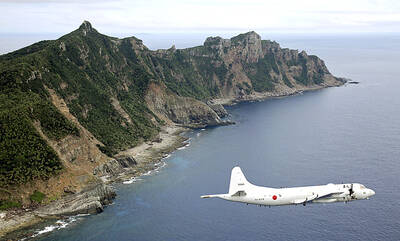Toyota Motor Corp said yesterday about 270,000 cars sold worldwide — including luxury Lexus sedans — had faulty engines, the latest quality lapse to hit the automaker following massive global recalls.
Japan’s top-selling daily Yomiuri said in its evening edition that Toyota would inform the transport ministry of a recall on Monday. The paper cited no sources.
Toyota spokesman Hideaki Homma said the company was evaluating measures to deal with the problem of defective engines that could stall while the vehicle is moving. He would not confirm a recall was being considered.
The automaker has been working to patch up its reputation after recalling more than 8 million vehicles worldwide because of unintended acceleration and other defects.
Of the 270,000 vehicles with engine problems, 180,000 were sold overseas and the rest in Japan. They include the popular Crown and seven models of luxury Lexus sedans.
Toyota said it has received about 200 complaints in Japan over faulty engines. Some drivers told Toyota that the engines made a strange noise.
Homma said there have been no reports of accidents linked to the faulty engines.
The automaker’s shares dropped 2.3 percent to close at ¥3,010 (US$34.07) in Tokyo yesterday.
US authorities recently slapped Toyota with a record US$16.4 million fine for acting too slowly to recall vehicles with defects.
Toyota dealers have repaired millions of vehicles, but the automaker still faces more than 200 lawsuits tied to accidents, the lower resale value of Toyota vehicles and the drop in the company’s stock.
In the aftermath of the recalls, the US Congress is considering an upgrade to auto safety laws to toughen potential penalties against automakers, give the US government more powers to demand a recall and push car companies to meet new safety standards.
Toyota said last week it would recall 17,000 Lexus luxury hybrids after testing showed that fuel could spill during a rear-end crash.

MISINFORMATION: The generated content tends to adopt China’s official stance, such as ‘Taiwan is currently governed by the Chinese central government,’ the NSB said Five China-developed artificial intelligence (AI) language models exhibit cybersecurity risks and content biases, an inspection conducted by the National Security Bureau (NSB) showed. The five AI tools are: DeepSeek, Doubao (豆包), Yiyan (文心一言), Tongyi (通義千問) and Yuanbao (騰訊元寶), the bureau said, advising people to remain vigilant to protect personal data privacy and corporate business secrets. The NSB said it, in accordance with the National Intelligence Services Act (國家情報工作法), has reviewed international cybersecurity reports and intelligence, and coordinated with the Ministry of Justice Investigation Bureau and the National Police Agency’s Criminal Investigation Bureau to conduct an inspection of China-made AI language

BOOST IN CONFIDENCE: The sale sends a clear message of support for Taiwan and dispels rumors that US President Donald Trump ‘sold out’ the nation, an expert said The US government on Thursday announced a possible sale to Taiwan of fighter jet parts, which was estimated to cost about US$330 million, in a move that an expert said “sends a clear message of support for Taiwan” amid fears that Washington might be wavering in its attitude toward Taipei. It was the first announcement of an arms sale to Taiwan since US President Donald Trump returned to the White House earlier this year. The proposed package includes non-standard components, spare and repair parts, consumables and accessories, as well repair and return support for the F-16, C-130 and Indigenous Defense Fighter aircraft,

CHECKING BOUNDARIES: China wants to disrupt solidarity among democracies and test their red lines, but it is instead pushing nations to become more united, an expert said The US Department of State on Friday expressed deep concern over a Chinese public security agency’s investigation into Legislator Puma Shen (沈伯洋) for “secession.” “China’s actions threaten free speech and erode norms that have underpinned the cross-strait ‘status quo’ for decades,” a US Department of State spokesperson said. The Chongqing Municipal Public Security Bureau late last month listed Shen as “wanted” and launched an investigation into alleged “secession-related” criminal activities, including his founding of the Kuma Academy, a civil defense organization that prepares people for an invasion by China. The spokesperson said that the US was “deeply concerned” about the bureau investigating Shen

DISPUTE: A Chinese official prompted a formal protest from Tokyo by saying that ‘the dirty head that sticks itself out must be cut off,’ after Takaichi’s Taiwan remarks Four armed China Coast Guard vessels yesterday morning sailed through disputed waters controlled by Japan, amid a diplomatic spat following Japanese Prime Minister Sanae Takaichi’s comments on Taiwan. The four ships sailed around the Senkaku Islands — known as the Diaoyutai Islands (釣魚台) to Taiwan, and which Taiwan and China also claim — on Saturday before entering Japanese waters yesterday and left, the Japan Coast Guard said. The China Coast Guard said in a statement that it carried out a “rights enforcement patrol” through the waters and that it was a lawful operation. As of the end of last month,